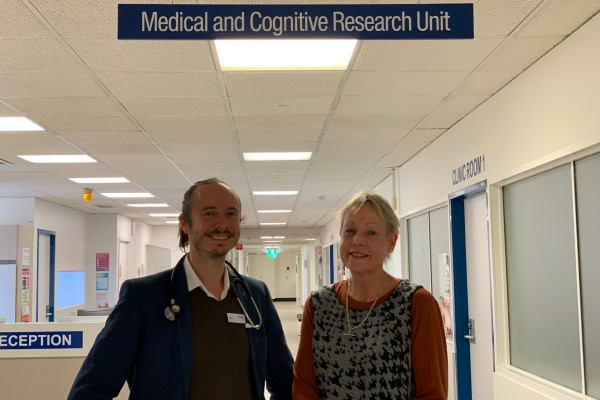About
First successful new Alzheimer's disease treatment trial in 20 years
- Home
- About
- Latest news
- First successful new Alzheimer's disease treatment trial in 20 years

Austin Health has been the national lead site for the first successful Alzheimer's disease treatment trial in 20 years, with results showing reduction in cognitive decline by twenty-seven per cent compared with placebo.
An estimated 500,000 Australians are living with dementia today, with the majority due to Alzheimer's disease. Dementia is the leading cause of death in women and the second leading cause of disease burden and death in Australians over the age of 65 years.
Dr Paul Yates is a Geriatrician, Deputy Director of Aged Care Research and lead Principal Investigator for the CLARITY and AHEAD studies in Australia.
"The CLARITY Study is the first ever clinical trial of a disease-modifying Alzheimer’s medication to meet its primary endpoint, or in other words, to achieve a successful result. In this study, participants with mild Alzheimer’s disease have been receiving fortnightly infusions of drug called Lecanemab, which is an antibody the beta-amyloid protein that is found in the brains of people with Alzheimer's disease," he explains.
Besides the fantastic result of reducing cognitive decline, the treatment was also shown to lower brain amyloid levels and achieve a significant difference in ability to perform activities of daily living.
"This was a multi-site international study, involving around 1700 patients around the world, including USA, Canada, Japan, Europe and Australia," he adds.
Dr Yates adds the success of this study was particularly noteworthy, given the challenges faced during the pandemic.
"It is really important to recognize the great contribution from our participants in all of our studies, who have continued to participate through all the ups and downs of the last few years".
"In addition, this success really is built on decades of work from many, including Austin Health's own Associate Professor Michael Woodward and Professor Chris Rowe, who have been pivotal in developing the capacity for running important dementia clinical trials here, and lobbying to bring the study to Australia and allow our patients to take part," he explains.
The data from this study are now going towards an FDA application in the United States, to get the drug approved for clinical use.
Dr Yates and his colleagues are now exploring whether medical professionals can identify people with dementia earlier and treat them before the symptoms begin, reducing or delaying cognitive decline.
"One of the important things this study has shown is that when you treat people with mild symptoms of Alzheimer's disease, you can reduce the rate of decline," Dr Yates says. "This and similar medications are also now being trialled at earlier stages of the disease, even before the symptoms begin, such as the AHEAD Study, which is currently recruiting."
"This medication represents a real breakthrough in the treatment options for dementia due to Alzheimer's disease. We need to continue to work to improve the detection, care and support for people with all forms of dementia," he adds.
If you would like to learn more about participation in dementia research and clinical trials, please contact the Medical and Cognitive Research Unit at MCRU.Recruitment@austin.org.au or call Jenny Kaiser (Study Recruitment) on 0403 110 157.
Is memory decline a worry?
Hear an ABC radio interview with Prof Michael Woodward, Director, Memory Clinic.



